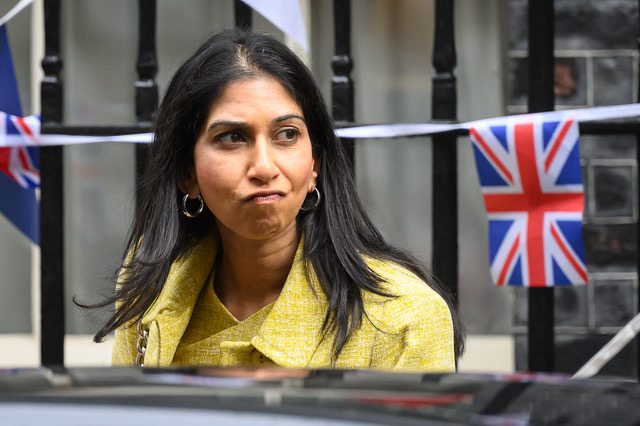Last week, the UK government raised the specter ‘once again’, of Britain leaving the European Convention on Human Rights (ECHR) and replacing the Europe wide obligations with its own homegrown ‘Bill of Rights’. The Bill of Rights in its current draft form, will allow the UK government to ignore ECHR interim interventions on crucial deportation issues. This announcement came in the aftermath of yet another set back in the courts, after the appeal courts ruled (29th July 2023) that the Rwanda plan is unlawful. It detemined that Rwanda is not a sufficiently safe country. The announcement by the UK government, was immediately met with a harsh rebuttal from the Law Society of England & Wales. The President of the Law Society, Lubna Shuja, issued a statement, which said:
Government policy – ‘A sledgehammer to crack a nut’
‘If the government wants to address problems in the asylum system, it can do so by bringing down the case backlogs and addressing the issues with the Illegal Migration Act. These will not be tackled by leaving an extremely successful international agreement designed to protect individual rights and support political stability. Leaving the ECHR would mean the UK would sit as an outlier in Europe, alongside only Russia and Belarus who are already outside of the Convention. This would be using a sledgehammer to crack a nut, when the government already has a perfectly good nutcracker it can use’
At the end of last week, which was supposed to be a relaunch of the ‘Stop the Boats’ project, aptly named ‘Stop the Boats Week’, we witnessed the project’s showpiece the ‘Bibby Stockholm Asylum barge’, having to depopulate the few migrants that had boarded thus far, due to an outbreak of legionnaires disease.
Migrant re-housing issue backfires
The government has made the ‘Stop the Boats’ project a central plank of its five pledges in the run up to the next general election. However its efforts to win votes by managing to control illegal migration, continue to falter as attempts to shift migrants from hotels to cheaper accommodation, seems to have backfired with the government’s adopting of sensational use of disused army bases and floating hotel barges to accommodate asylum seekers, stirring protests from local and nearby residents. At every point an intransigent Home Secretary, Suella Braverman, has remained resolute against the constant threat of legal challenge in the high courts and she marches on regardless. The latest move by government, to threaten to leave the ECHR mechanism, should the Supreme Court fail to overturn the ruling in the Appeals court and declare the Rwanda project legal, is seen by many as yet another act of intransigence.
This is not the first time the threat of leaving the ECHR mechanism has been made. Indeed it was central component of the plans of the former Home Secretary, Theresa May, and subsequently Lord Chancellor, Dominic Raab. Back in April 2016, Theresa May ruffled the feathers of many of her backbench colleagues when she spoke at a conference and said:
The ECHR ‘binds the hands of parliament’
‘The ECHR can bind the hands of parliament, adds nothing to our prosperity, makes us less secure by preventing the deportation of dangerous foreign nationals – and does nothing to change the attitudes of governments like Russia’s when it comes to human rights’
Senior of May’s colleagues as well as many on the opposition benches, met these comments with outrage and derision. Charles Falconer, the then Shadow Secretary for Justice, described her comments as ‘so ignorant, so illiberal, so misguided’. The former Attorney General, Dominic Grieve, was barely able to hide his disapproval, expressing his ‘disappointment of the intervention’.
The spokesperson for the then Prime Minister, David Cameron said at the time:
‘The PM has made clear he wants to see reform of the ECHR and has ruled absolutely nothing out if we don’t achieve that’
It was made clear that there was no suggestion of the UK leaving the ECHR mechanism at that time.
New Bill of Rights
Six years later in 2022, as the country faced something of a stalemate over the Good Friday Agreement, Dominic Raab, and the Lord Chancellor at the time, offered a reworking of the Bill of Rights and added a crucial comment about Britain’s future participation in the ECHR. He said:
‘In the future, depending on the situation we find ourselves in, given the ebb and flow of the approach Strasbourg has taken, I don’t think it’s responsible for the government to rule things out’
During this entire period, the interventions of the ECHR – to prevent what it regarded as any breach in human rights, have been held up as the evidence of a controlling outside force, at odds with the sovereign decisions of a UK justice system.
Yet, the history of the European Convention on Human Rights, is one which began on our own shores. Indeed, the principal architect of the conventions was none other than British Conservative MP and lawyer, David Maxwell-Fyfe and it was Winston Churchill who championed his final draft.

This makes it all the more a strange anomaly that the latest champion of this idea, is, as one news publication put it, ‘the daughter of immigrants, a Buddhist and a francophone’, born of East African/Indian immigrants, who emigrated to the UK in the 60’s. I am of course referring to the current Home Secretary, Suella Braverman.
At the Conservative Party Conference last year, speaking in reference to the ECHR, she told the audience:
‘I don’t think we need to be subject to an institution born out of the post-war era which is a bit analogue in the way that it operates, which has centralised power, which is distant and which is politicised, which is pursuing an agenda which is at odds with our politics and our values. I don’t think that’s the direction that the world is going in, that’s not the direction that people called for with Brexit’
She boldly dismissed all suggestions by political and human rights pundits alike, that it was hypocritical for her as a member of an ethnic minority, to be taking the lead in policies which were seen as xenophobic and racist. She said:
‘It’s not xenophobic to say that mass and rapid migration places pressure on housing, public services and community relations. I reject the Left’s argument that it is hypocritical for someone from an ethnic minority to tell these truths…[it’s not] racist to want to control our borders or bigoted to say that we have too many asylum seekers who are abusing the system’
Interim Measures regarded as a threat to the UK’s judicial integrity
The government has been clear in its message, ‘no more interference or we are leaving’.
A small, but very vocal group of back bench MPs have been consistently pressing the government to introduce legislation which would allow them to ignore so called ‘interim rule 39 orders’, which have resulted in a sizeable number of interventions to UK government orders – preventing deportations and exclusions. Toughening UK law rather than abandoning UK’s obligations to the ECHR, has gained some traction in parliament. But the frustration following the catalogue of recent failures, has ensured that the blunt tool of exit from the ECHR now remains high on the cards. Interestingly, the Prime Minister, Rishi Sunak , similarly of East African/Indian heritage, has although somewhat cautiously and amid calls of hypocrisy, hinted at his support for leaving the ECHR mechanism. One of his advisors recently spoke to one of the established news magazines to explain the Prime Ministers position should Strasbourg rule that Suella Braverman’s Rwanda Project was unlawful. He said:
‘The PM has been clear he wants to introduce legislation that meets our international obligations. This bill will go as far as possible within international law. We are pushing the boundaries of what is legally possible, while staying within the ECHR. But if this legislation gets onto the statute book and is found to be lawful by our domestic courts, but it is still being held up in Strasbourg, then we know the problem is not our legislation or our courts. If that’s the case, then, of course, he will be willing to reconsider whether being part of the ECHR is in the UK’s long-term interests’
Back in May, at the ‘Council of Europe’ Summit in Iceland, The UK Prime Minister was preparing the ground to remove obstacles to the Rwanda plan, as he sent the first salvo in the threat of exit to the ECHR. He said:
‘[the] current international [migration] system is not working…We need to do more to cooperate across borders and across jurisdictions to end illegal migration and stop the boats. Despite the recent loss in the Appeal Court, Immigration Minister, Robert Jenrick, expressed his optimism that the government would be successful in the Supreme Court and he said:
‘We believe that our current plan is in accordance with our international law obligations and the judgement in the High Court and Court of Appeal give us reason to be confident that we’ll succeed in the Supreme Court. But we don’t rule anything out – we will do whatever is necessary’
Chatham House’s Director, International Law Programme, Rashmin Sagoo argued that a UK exit from the ECHR would seriously undermine important international law provisions concerning enforcement and judicial cooperation. She said:
‘More significantly and closer to home, the ECHR is a fundamental part of the Good Friday Agreement. It is difficult to argue UK withdrawal would not breach the agreement. As well as risking damage to intercommunal relations, such a breach is likely to significantly harm strategic relations with the US – and President Biden is set to visit Northern Ireland and the Republic of Ireland to mark the 25th anniversary of the Good Friday Agreement.’









